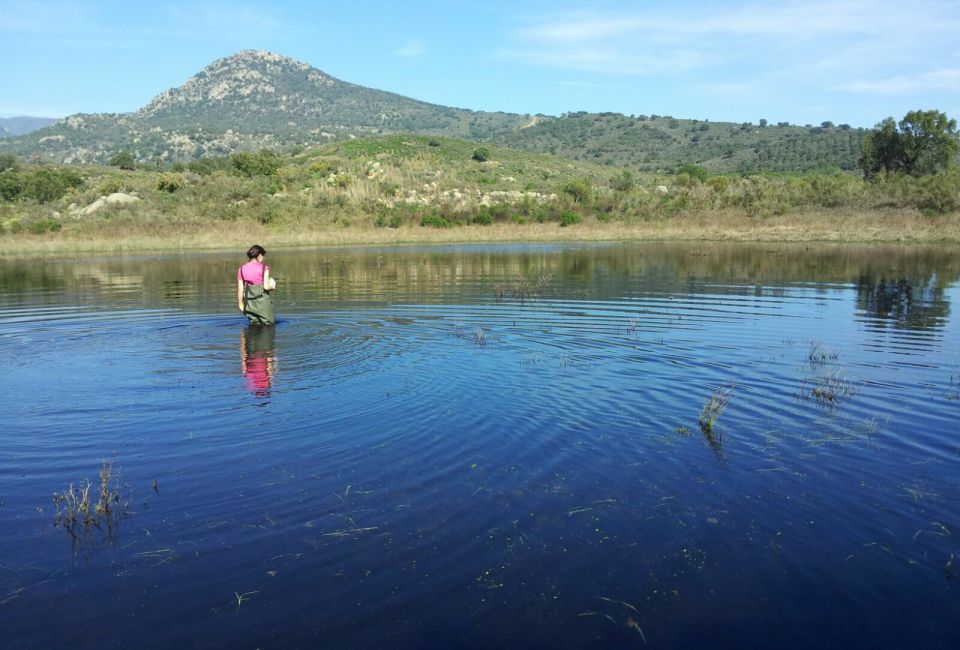
Good conservation and management of lakes and ponds can contribute to slowing climate change
Fresh water on planet Earth is scarce, as it accounts for only about 2.5% of the total. Between 30% and 50% of this total fresh water area is in pools and ponds, a resource that despite being exceptional is home to 70% of Europe's aquatic species. They also contain more rare, endemic and endangered species such as amphibians, invertebrates or plants, than those found in lakes or rivers. The small size of pools and ponds has even today led to doubts being raised over their status as resources that contribute to the planet's biological balance and to the fight against climate change.
These ecosystems are an asset for mitigating climate change while providing society with benefits that often go unnoticed. Examples include the water supply, flood control, CO2 uptake or and many health benefits for people. In this context, the PONDERFUL project (POND Ecosystems for Resilient Future Landscapes in a changing climate), led by the Aquatic Ecology research group at the University of Vic - Central University of Catalonia (UVic-UCC) will be studying ponds and lagoons across Europe for four years, in order to determine their implications for climate change and to improve the conservation of their ecosystems and biodiversity.
The main objective of the project, which is being led by the ICREA research professor Sandra Brucet, is to use ponds and pools as nature-based solutions to act against climate change and to improve the conservation of diversity, ecosystems and the well-being of society. The project will therefore study pond networks and identify opportunities, returns and barriers to implementing nature-based solutions. For example, the team will consider: what are the returns involved in restoring a pond? What are the costs and benefits of preserving its biodiversity? What are the barriers to doing so?
To make this possible, PONDERFUL will assess the interactions and feedback between these ecosystems and the rest of the biodiversity in various pools and ponds in multiple locations. The results will be obtained by sampling in various parts of the European Union, Turkey and Uruguay in Latin America, and they will subsequently be used to produce a guide to financing and sustainable investment for the implementation of nature-based solutions. This guide will be aimed at raising awareness of the conservation of the biodiversity of lakes and ponds.
Eighteen partners from eleven countries
PONDERFUL is a project involved 18 partners, including universities, research centres and private institutions in the 11 countries involved. In addition to UVic-UCC, other participants include the University of Girona and Randbee Consultants, in Spain; the IGB Leibniz-Institute of Freshwater Ecology and Inland Fisheries, the Ecologic Institute of Berlin and the Technische Universitaet Muenchen in Germany; the Katholieke Universiteit Leuven in Belgium; the Higher Specialized School of Western Switzerland in Switzerland; the University College in London, Bangor University and the Freshwater Habitats Trust in the United Kingdom; the Middle East Technical University, in Turkey; the CIIMAR - Centro Interdisciplinar de Investigação Marinha e Ambiental in Portugal; Aarhus Universitet, in Denmark; Uppsala Universitet on Sweden; the Institut Superieur d'agriculture Rhone Alpes and Amphi International, in France, and the Universidad de la Republica in Uruguay.
"This wide range of partners from various countries means that we can undertake multiple sampling in lagoons and ponds in various locations, and enables a much broader analysis of the current situation," says the coordinator of the Aquatic Ecology research group and the project's lead researcher, Sandra Brucet. The ICREA research professor emphasises the importance of involving stakeholders in the project, including managers, farmers, NGOs, county and town councils, among others, "to coordinate the management of these spaces."
Mireia Bartrons, a researcher in the Aquatic Ecology research group, stresses that their point of view must be taken into account and that throughout the project, "many meetings with them will take place to provide conclusions and recommendations focusing on European directives, which must be aligned with these interest groups."
Apart from the research group responsible for the project, UVic-UCC's Centre for Interdisciplinary Gender Studies (CEIG), led by Gerard Coll, is also involved. Following the European Union's recommendations on gender issues, the group will be responsible for gender mainstreaming in the content and activities that will take place during the project's life cycle. Examples include participation in surveys, ensuring gender parity in contracting and activities, and managing the gender dimension in the research.
Sampling in three bioclimatic zones: Mediterranean, Atlantic and continental
A total of 16 samplings will be carried out over the 4 years that the project lasts, which are divided into three different bioclimatic zones: the Mediterranean zone, which includes Spain, Turkey and Uruguay; the Atlantic zone, which includes Belgium and the United Kingdom, and finally the continental zone, which covers Switzerland, Denmark and Germany. As for the places where the sampling will take place, the number of pools and ponds, their landscape, the specific ecosystem services they provide and the regulation of the quantity and quality of water have already been identified, among other parameters.
Several areas have been identified for analysis in Catalonia. They are three areas located in Girona, the Baix Ter region (the Montgrí Natural Park, the Medes Islands and the Baix Ter) and the Albera and Cap de Creus ponds, and areas in central Catalonia that have yet to be defined will also be studied. Ten of the total number of ponds sampled will be resampled, i.e. they will also be sampled next year to see the year-on-year variability in the ecosystem.
The project is part of the European Union's Horizon 2020 call, and has a total budget of almost 7 million Euros, of which UVic-UCC has obtained 800,000 Euros. The project, which is expected to be completed by November 2024, was launched on 1 December.